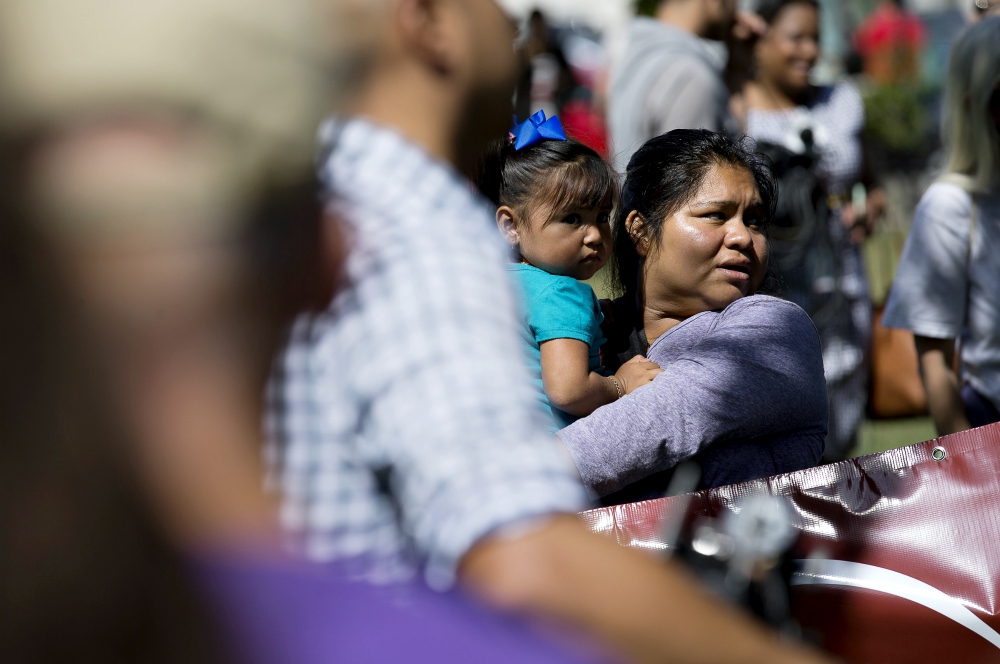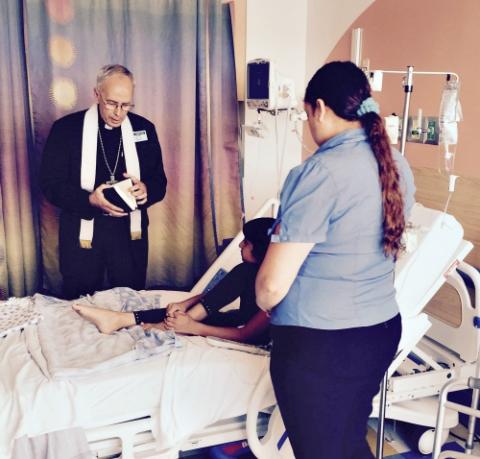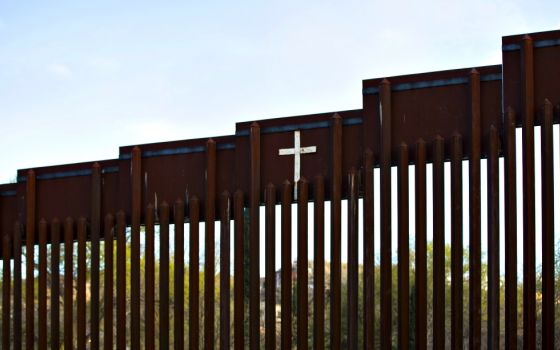
A woman holds a child during an immigration rally near the U.S. Capitol in Washington Sept. 26. (CNS/Tyler Orsburn)
To the alarm of immigrant rights groups, President Donald Trump has spent the first months of his presidency putting his anti-immigrant campaign promises into action.
"That rhetoric we were hearing in the election season has moved into actual policy," said Jeanne Atkinson, executive director of the Catholic Legal Immigration Network Inc. "I think immigration is one of the most prominent policy areas of this administration and ... we're seeing public policy going in the wrong direction."
Within a few days of taking office, Trump issued executive orders that barred sanctuary jurisdictions from receiving federal funds, called for the hiring of more Border Patrol and Immigration and Customs Enforcement agents, increased detention of immigrants and created a weekly list of crimes committed by undocumented immigrants.
Another controversial order barred immigrants from seven Muslim-majority countries for 90 days, all refugees for 120 days and Syrian refugees indefinitely.
The order has been modified twice in response to challenges from courts and parts of its most recent version, issued Sept. 24, have been temporarily blocked by federal judges. The current order excludes some Venezuelan government officials and their families as well as most visitors from five of the original countries, plus Chad and North Korea.
A separate announcement in September set the number of refugees to be admitted to the U.S. in the next year at 45,000, a historic low.
David Robinson, director of Jesuit Refugee Service, called the combination of the travel ban and historically low resettlement numbers "shameful" and "a real retreat from American leadership and values."
According to the U.N. Refugee Agency, there are 65.6 million forcibly displaced people worldwide, the highest levels of displacement on record.
"The U.S. has been the mainstay of an international system ... that responds to these kinds of crisis," Robinson said. "At a time when that system is in desperate need of support, we appear at least to be drawing back from it. That's the wrong message and exactly the wrong time to give it."
Dylan Corbett, founding director of the Hope Border Institute, was equally dismayed by the way Trump's policies and rhetoric are affecting the treatment of migrants on the border.
In the past, he said, immigration officials could exercise discretion for the sake of resource allocation or humanitarian concerns. Now, asylum seekers without criminal records are not freed from detention while they pursue their cases and people with extenuating circumstances have more difficulty getting discretionary humanitarian relief from deportation.
In one case, Maria De Loera, a widowed mother in Texas who was granted relief under Obama because her daughter was fighting cancer, was almost deported.
On Aug. 8, after Bishop Mark Seitz of El Paso, Texas, attended De Loera's ICE meeting to advocate for her, she was granted a six-month stay from deportation to continue caring for her daughter.
"We had to mobilize the bishop; we had to mobilize everything we could," said Corbett. "Before, you didn't mobilize around those things because those were the easy cases."
Corbett also noted an increase in family separations and ongoing problems with due process, transparency and legal services that make it difficult for immigrants in detention to pursue legitimate claims. The situation will only worsen, he said, because the Trump administration is "committed to politicizing the border and imposing policies which don't reflect the reality of this border ... which target and demonize migrants."
Trump does seem to be making an effort to intensify his immigration policies. On Oct. 8, he released a list of priorities that include hiring more ICE agents, cracking down on visa overstays and sanctuary cities, building a border wall, facilitating deportation of unaccompanied minors and asylum seekers, and shifting to a "merit-based" immigration system.
Catholic groups such as the Sisters of Mercy of the Americas, the U.S. Conference of Catholic Bishops' Committee on Migration, and Network Lobby for Catholic Social Justice have criticized these policies, supporting an immigration system that favors family reunification and humanitarian concerns.
They were especially upset by Trump's attempt to tie the fate of the Deferred Action for Childhood Arrivals program — which grants protection from deportation and work authorization to young undocumented immigrants who were brought to the U.S. as children — to the enactment of his entire list of immigration priorities. The DACA program was established five years ago by an executive order from then-President Barack Obama.
Trump ended DACA, but with a six-month delay he said was intended to give Congress time to pass a legislative solution.

Bishop Mark Seitz of El Paso, Texas, prays with Maria De Loera and her 8-year-old daughter, Alia, Aug. 7. (CNS/Courtesy of Hope Border Institute/Dylan Corbett)
Now, immigrant rights groups say Trump is making impossible demands in exchange for protecting DACA recipients. They hope the Dream Act, which would grant DACA holders legal status, has enough bipartisan support to pass by itself.
Another concern is the future of temporary protected status, a program that lets immigrants from areas that are experiencing violence or natural disasters stay in the U.S. until conditions in their home countries improve. Under Trump, Sudan's temporary protected status is set to end next year and Atkinson worries that Central America and Haiti could follow, forcing nearly 400,000 immigrants to return to dangerous situations.
However, Atkinson also emphasized that public outcry has made a difference, and expressed hopes that its influence could increase.
"If people are paying attention, educating themselves and calling their members of Congress, I think it will have an impact," she said.
Corbett agreed. "We've seen people reject the notion that our border should be this hardened place of hatred and exclusion and xenophobia," he said. "People are starting to realize that the identity of our nation is at stake."
Others were heartened by the ways that legislative and judicial branches of the government have mitigated some of Trump's policies.
Advertisement
Kristen Lionetti, policy director of the Office of Justice and Ecology of the Jesuit Conference of Canada and the U.S., said the absence of new immigration legislation had given the executive branch too much power, but acknowledged that Trump has been limited by Congress' reluctance to fund all of his projects.
Lionetti also expects that Trump will continue to be checked by the judicial branch, which has already challenged his attempts to ban immigrations from Muslim-majority countries and to withhold funding from sanctuary cities.
Robinson was even more enthusiastic about the response from other branches of government.
"It sort of reinforces my faith in the way both our government ... and the American people respond to these things," he said, adding that Jesuit Refugee Service has seen an outpouring of support for refugees.
"We hope the government will listen to that and climb on board."
[Maria Benevento is an NCR Bertelsen intern. Her email address is mbenevento@ncronline.org.]








